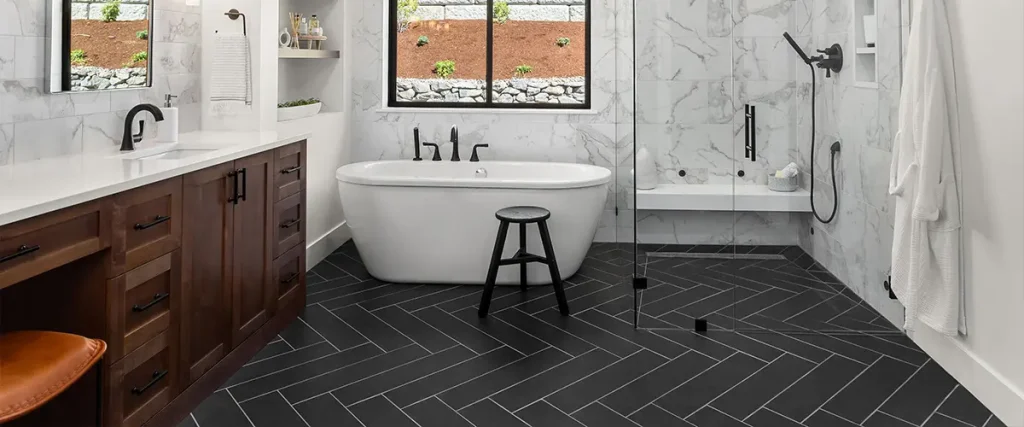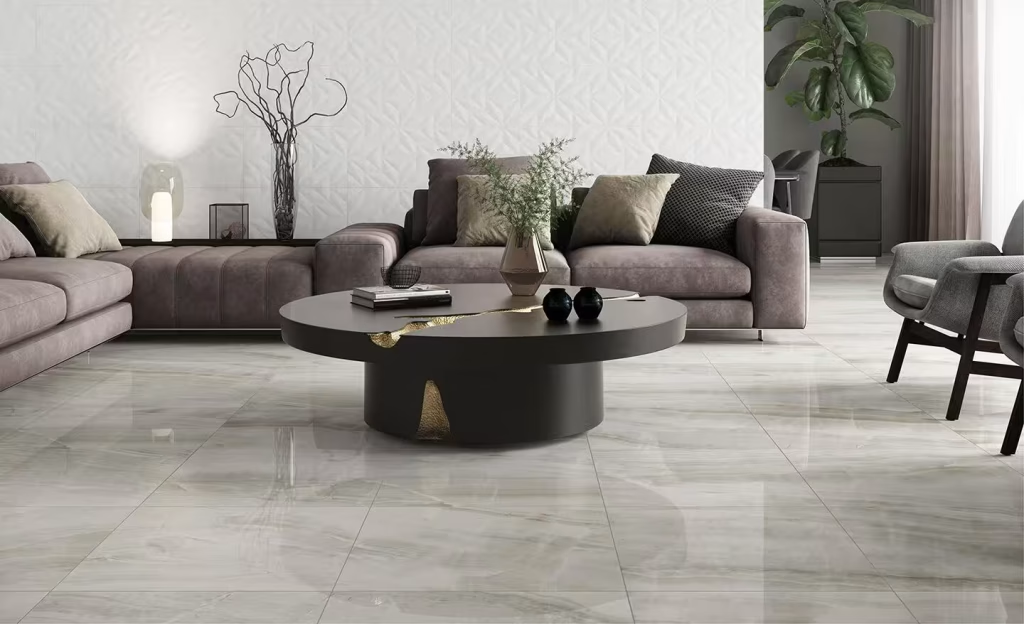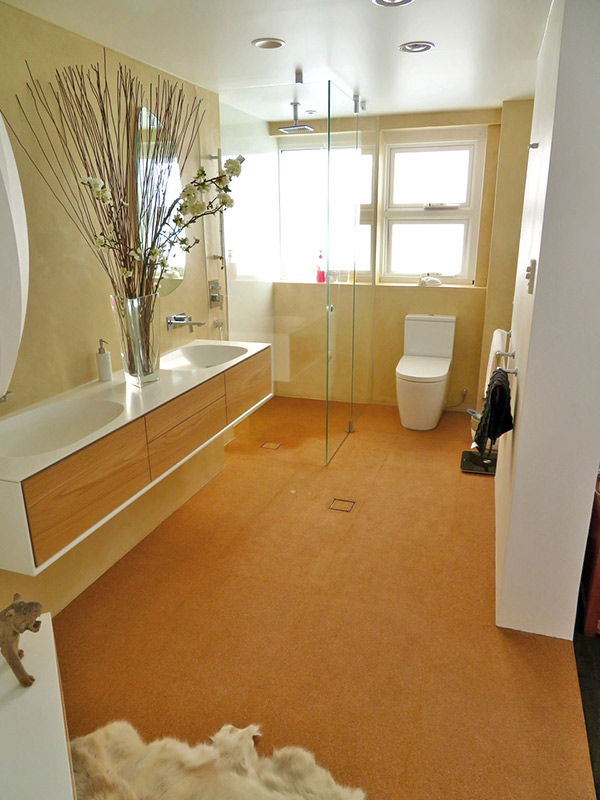When embarking on a bathroom renovation, one of the most important decisions you’ll make is choosing the right bathroom flooring options. Flooring plays a crucial role in the overall aesthetic, functionality, and durability of your bathroom, especially given the high-moisture environment. Whether you’re planning a small bathroom remodel, a luxury bathroom remodeling project, or a complete bathroom makeover, selecting the right flooring material can elevate your space. Here’s a comprehensive guide to the best bathroom flooring options, considering style, durability, and maintenance.
1. Considerations for Choosing Bathroom Flooring

Before diving into specific materials, it’s important to consider several factors that will influence your decision:
- Moisture Resistance: Bathrooms are high-moisture areas, so your flooring must be able to withstand spills, humidity, and water exposure.
- Durability: High-traffic areas, such as those around the walk-in shower design or bathtub replacement, need flooring that can handle wear and tear over time.
- Style and Design: Your flooring should complement the overall bathroom design ideas, whether you’re opting for a modern bathroom remodel, a luxury bathroom remodeling project, or a spa bathroom atmosphere.
- Eco-friendliness: If you’re undergoing an eco-friendly bathroom remodel, sustainability will be a key consideration in choosing your bathroom flooring.
2. Popular Bathroom Flooring Options
Now that you know what to consider, let’s explore the best bathroom flooring options for different remodeling projects.
1. Ceramic and Porcelain Tiles

Ceramic tiles are one of the most popular flooring choices for bathroom remodels, and for good reason. They are durable, water-resistant, and available in an array of colors, patterns, and textures. You can create a stunning tile backsplash in your shower or around the bathroom vanity for a cohesive look.
- Benefits: Ceramic and porcelain tiles are waterproof, easy to clean, and come in an extensive range of designs. They are also available in large formats, making them ideal for larger bathrooms or a luxury bathroom remodeling project.
- Best for: Modern bathroom remodels, custom bathroom remodels, and any project where waterproof bathroom materials are necessary.
2. Vinyl Flooring
If you’re looking for a more affordable option, vinyl flooring offers great durability and water resistance at a lower cost. New advancements in vinyl technology have made it possible to achieve the look of natural stone or wood with a more budget-friendly and easy-to-maintain material.
- Benefits: Vinyl is not only waterproof but also flexible, making it comfortable underfoot. It’s available in various colors and styles, making it easy to match with any bathroom design ideas. It’s also great for DIY bathroom renovations, as it’s relatively easy to install.
- Best for: DIY bathroom renovations, small bathroom remodels, and bathroom remodel cost-conscious projects.
3. Natural Stone

For those undergoing luxury bathroom remodeling, natural stone materials such as marble, slate, or granite offer timeless elegance and unparalleled durability. These options work well with luxury bathroom remodels and can be used to create a sophisticated, spa-like ambiance in your bathroom.
- Benefits: Natural stone is beautiful, durable, and can withstand moisture. It also adds a luxurious touch, especially when paired with high-end bathroom fixtures or a custom bathroom vanity.
- Best for: Luxury bathroom remodeling, bath renovation ideas, and homeowners looking for high-end bathroom flooring options.
4. Engineered Wood Flooring
While traditional hardwood floors aren’t ideal for bathrooms due to their susceptibility to moisture damage, engineered wood flooring is a great alternative. This type of flooring has a moisture-resistant core, making it suitable for bathrooms.
- Benefits: Engineered wood provides the warmth and elegance of real wood without the downsides. It’s durable, easy to clean, and comes in a variety of finishes to match any bathroom design ideas.
- Best for: Contemporary bathroom design, bathroom remodel planning, and adding a natural touch to your bath renovation.
5. Cork Flooring
For those looking for a sustainable and eco-friendly option, cork flooring is an excellent choice. It’s soft, warm, and has natural water resistance, making it a good option for bathrooms with sustainable bathroom design in mind.

- Benefits: Cork is hypoallergenic, comfortable underfoot, and offers excellent insulation properties. It also has a natural, organic look that fits well with bathroom makeover projects focused on eco-friendliness.
- Best for: Eco-friendly bathroom remodels, sustainable bathroom design, and homeowners looking for a unique material that adds warmth and texture.
6. Concrete Flooring
Concrete is gaining popularity in modern bathroom designs due to its sleek, industrial look. When sealed properly, concrete is water-resistant and highly durable, making it ideal for high-moisture areas.
- Benefits: Concrete is incredibly durable, customizable, and easy to maintain. It can be polished, stained, or even textured to create a distinctive look. You can also incorporate radiant heating systems beneath concrete floors for added comfort in your bathroom.
- Best for: Modern bathroom remodels, luxury bathroom remodeling, and bathroom remodel trends that embrace minimalist, industrial styles.
7. Rubber Flooring
Another great option for an eco-friendly bathroom remodel is rubber flooring. It’s slip-resistant, water-resistant, and comfortable underfoot, making it perfect for bathrooms, especially for households with children or elderly individuals.

- Benefits: Rubber flooring is durable, sustainable, and easy to clean. It’s available in a wide range of colors and textures, allowing you to create a unique look.
- Best for: Eco-friendly bathroom remodels, bathroom storage solutions, and spaces that require a non-slip surface.
3. Flooring Maintenance and Waterproofing
No matter which flooring option you choose, it’s essential to consider waterproof bathroom materials and proper maintenance. Some materials, like vinyl and ceramic tiles, are low-maintenance and resistant to water damage. For luxury bathroom remodeling, natural stones may require sealing to prevent water infiltration and staining.
Bathroom remodel cost can fluctuate depending on the material you choose, so balancing aesthetics with longevity is essential. If you opt for a material like natural stone, ensure you’re prepared for periodic maintenance, including resealing.
4. Final Considerations: Style and Budget
When selecting bathroom flooring, keep in mind the overall bathroom design ideas and the bathroom remodel cost. Whether you’re focusing on a bathroom makeover or opting for a custom bathroom remodel, the flooring should complement other features like bathroom mirrors, bathroom counters, and shower doors.
If you’re concerned about staying within a specific budget, bathroom budget tips suggest mixing high-end elements, like luxury bathroom remodeling fixtures, with more affordable materials, such as vinyl flooring or ceramic tiles, to maintain style without breaking the bank.
Conclusion
Choosing the right bathroom flooring options is essential for creating a functional, stylish, and durable bathroom. Whether you’re updating an existing space with bathroom tiles and a bathroom vanity or undergoing a full bath renovation, the flooring you choose will have a significant impact on the overall look and feel of the room. By considering factors like moisture resistance, durability, maintenance, and style, you’ll ensure that your bathroom remodel not only meets your needs but also stands the test of time.
